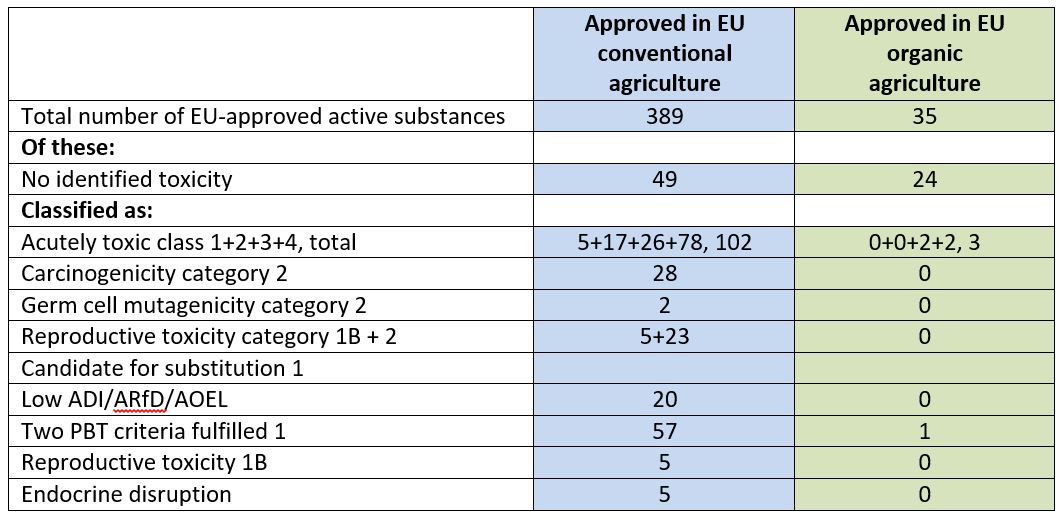Is Organic Better?
There is an ongoing debate about the use of pesticides in organic agriculture. Many pro-pesticide commentators are quick to criticise organic products and point out that they can be as harmful to human health and the environment as non-organic products.
This document aims to clearly set out the position of PAN UK on this issue. We aim to clarify some of the misunderstandings that surround this contentious subject. There are a number of matters that need to be addressed and these are laid out below.
How many pesticides are used in organic agriculture?
Most people wrongly assume that no pesticides are used in organic farming. However, it is important to note that organic farming takes a completely different approach to the use of pesticides compared to conventional farming.
In the EU, according to the pesticide approvals database, there are currently 490 substances approved for use as pesticides, of these only 28 are approved for use in organic agriculture.
Table 1: Number of pesticides approved for use in organic agriculture

Active substances approved in the EU and important toxicological properties according to risk assessments by EFSA. Data compiled from the EU pesticides database [112] and from Commission Regulation 889/2008 (consolidated version 2016-05-07) Annex II Sections 1-3 [113] (taken from European Parliament report – Human health implications of organic food and organic agriculture – December 2016).
Are pesticides in organic agriculture a matter of concern for human health or the environment?
For the most part no, they are not. Of the 28 approved pesticides used in organic agriculture, the majority are of low toxicological concern to consumers or the environment. This is as a result of their intrinsic nature or the method in which they are used.
Spearmint oil, citronella, quartz sand and others are not associated with any toxicity issues. Iron, potassium, bicarbonate and vegetable oils are all part of the human diet and have no toxicological issues.
There are some synthetic pesticides approved for use such as pyrethroids, pheromones and deltamethrin but these are only allowed to be used in insect traps and are not applied to soil or plants. Two pesticides that do give PAN UK cause for concern are pyrethrins and copper. We would like to see these phased out of use in organic agriculture.
Are pesticides used in the same way in organic agriculture as in conventional agriculture?
Organic farming relies largely on preventative measures to control pests and diseases. Therefore, pesticide use is significantly lower than non-organic agriculture. It is estimated that if all farming was organic the amount of pesticides being sprayed would decrease by 98%.
Pesticides applied to an organic crop must be approved for use and the use must be justified. The justification is based on whether a farmer has already tried non-chemical preventative methods and is treated as a last resort for a particular problem.
Apart from the reduced number and amount of pesticides applied to organic produce, the major difference is that unlike non-organic agriculture there is no routine application of pesticides. There is also no prophylactic use of pesticides as is the case with pesticide treated seeds.
Is organic better for the environment?
PAN UK is the first to admit that there are many non-organic farmers that are doing great things for the environment and trying to increase biodiversity, soil health and water quality in and around the land that they farm. But on the whole, it appears that organic agriculture is indeed of greater benefit to the environment and biodiversity than non-organic.
One particular benefit is that organic farms have a greater diversity of weeds and other plants which provide habitat and food for birds, bees and other farmland species.
Is organic food better for your health?
Due to a lack of reliable studies on this subject it is currently impossible to prove that there are intrinsic health benefits from following an organic diet. However, there is one area where organic outperforms non-organic and that is in regard to pesticide residues present in the food we consume.
In the UK, pesticide residues are found in approximately 60% of the non-organic fruit and vegetables that are available to consumers. Many of these contain the residues of more than one pesticide so in effect they offer a cocktail of residues with each bite. On the other hand there is almost never a detectable pesticide residue present on organic produce. On the rare occasion that a residue is detected on organic food, it is usually as a result of cross-contamination from non-organic agriculture, or as a result of pesticide persistence in the environment.
It is a fact that consuming organic produce is an effective way to reduce your dietary exposure to pesticides.
Conclusion
PAN UK supports organic agriculture for a number of reasons
- In comparison to non-organic methods organic agriculture uses fewer pesticides and in smaller amounts
- Organic agriculture is more beneficial to biodiversity and the environment in general
- Organic produce reduces dietary exposure to pesticides
